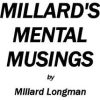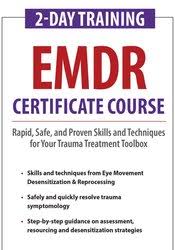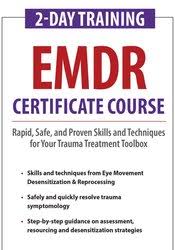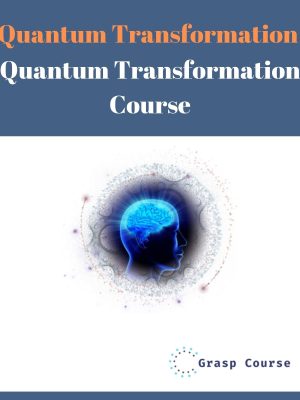Jennifer Sweeton – 2-Day Training, EMDR Certificate Course
$440.00 Original price was: $440.00.$113.05Current price is: $113.05.
Available for Pre-Order. This product will be available within a few days.
Jennifer Sweeton – 2-Day Training, EMDR Certificate Course
Watch this 2-Day EMDR Certificate Course recording and discover how this powerful, evidence-based treatment has helped thousands of clients safely and rapidly process their traumas so they can reclaim their lives!
You’ll learn:
- How EMDR can be used to overcome avoidance in clients
- How EMDR techniques can help clients resolve traumatic memories
- When and with which clients EMDR should be used
- How to emphasize safety during sessions
- How the 8-phase model is used in treatment
Learn how EMDR can help clients who desperately need relief from trauma!
***This training is not affiliated with EMDRIA and does NOT qualify towards EMDRIA credits, training, or certification
- Establish the role of the autonomic nervous system in trauma symptomology.
- Articulate the clinical implications of the freeze response in trauma treatment.
- Characterize the potential neurobiological mechanisms of change in the empirically validated EMDR approach.
- Specify how EMDR techniques can build dual awareness in clients to treat the avoidance that makes trauma treatment challenging.
- Communicate the 8 Phases of the EMDR protocol.
- Determine which clients you should use EMDR with.
- Analyze resourcing strategies from EMDR that clinicians can use to help facilitate the processing of trauma.
- Characterize how EMDR techniques can be used to reinforce and activate positive neural networks.
- Communicate how EMDR can be modified to work with complex/developmental trauma to directly treat traumatic memories.
- Evaluate strategies that can help foster the critical connection between client and therapist in EDMR therapy.
- Articulate the research limitations and potential risks associated with EMDR.
- Establish the order of operations for attachment-based EMDR treatment to resolve relational trauma.
Trauma and Neuroscience
- Key brain areas involved in trauma
- Polyvagal Theory, and types of freeze responses
- Trauma and insecure attachment
- The neuroscience of developmental trauma
- Clinical implications of the freeze response
How the EMDR Approach Works
- The neuroscience of exposure therapy and cognitive therapy
- The neuroscience of relaxation exercises
- EMDR and other “transformative therapies”
- Why EMDR works so well from a brain perspective
Trauma Symptoms and Assessment Tools
- Traumatic memories and intrusive thoughts
- Phobias and anxiety: Insula hyperactivation
- Emotional hijackings and implicit memory
- Avoidance cluster of symptoms
- Why treating avoidance in trauma is critical
- DSM-5® symptoms in a nutshell
- Connecting to a diagnosis
- Simple vs. complex trauma
- Intergenerational trauma
- Symptom clusters and physical manifestations
- CAPS-5 and PCL-5
- Primary Care PTSD Screen
- Dual diagnosis
Overcome Avoidance with EMDR
- Dual awareness
- What you are thinking about is the network you’re in
- Activate networks for change
- Neurons that fire together, wire together (Hebbb’s Rule)
- EMDR as neuroentrainment
When to Use EMDR in Treatment
- Demonstrations and experiential exercises
- Single event trauma
- Anxiety disorders involving imaginal exposure
EMDR Trauma Treatment: The Original 8-Phase Model
- Client history and treatment planning
- How to resource: Create as safe space
- Assessment: Choose a target, SUDS, connect with the image/emotions/thought
- Desensitization: Tactile vs. auditory vs. eye movement
- How to use touchpoints, Theratapper, CDs
- Positive Cognition Installation: Likert scale 1-7
- Body Scan: Locate tension and distress in the body
- Closure: Close the neural network and the 6-hour window
- Re-evaluation
Would you like to receive Jennifer Sweeton – 2-Day Training, EMDR Certificate Course ?
Demonstration of Original 8-Phase Model
- Presenter demonstration
- Attendee dyad practice of the 8-phase model
EMDR Techniques to Resolve Traumatic Memories
- Modifications for Complex/Developmental Trauma
- Do not use standard protocol – Rationale for modifications
- Resourcing strategies
- Techniques to reinforce and activate positive neural networks
- Relevance of Polyvagal Theory, early trauma, and EMDR
- Sensory motor modifications and somatic approaches
- How to build Dual Awareness
- EMDR techniques to bring traumatic memories from the limbic system into the prefrontal cortex
Attachment-Based EMDR: Strategies to Treat Relational Trauma
- Strategies to foster the critical connection between client and therapist
- Mirror neuron activation
- How to emphasize safety during sessions
- Guidance on order of operations
Research Limitations and Potential Risks
Be the first to review “Jennifer Sweeton – 2-Day Training, EMDR Certificate Course” Cancel reply
Related products
NLP - Self-help - Dating
NLP - Self-help - Dating
NLP - Self-help - Dating
NLP - Self-help - Dating
Sal Buscemi (Dandrew Media) – Institutional Intelligence: Sales Desk Scripts
NLP - Self-help - Dating
Complete HypnoThoughts Live 2016 Conference (Audio Recordings Package)
NLP - Self-help - Dating
NLP - Self-help - Dating
NLP - Self-help - Dating
Richard Bandler – 30 Courses Collection | Happy Life, Neuro Hypnotic, Persuasion, …













Reviews
There are no reviews yet.